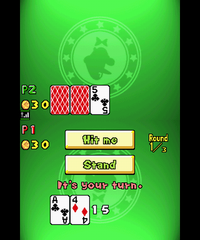Luigi-Jack: Difference between revisions
mNo edit summary |
(Revise, and add information in games of 3 or 4 players) |
||
| Line 2: | Line 2: | ||
'''Luigi-Jack''' is a multiplayer Table [[minigame]] in ''[[New Super Mario Bros.]]'' that is named after and played like the actual card game, [[wikipedia:Blackjack|BlackJack]]. | '''Luigi-Jack''' is a multiplayer Table [[minigame]] in ''[[New Super Mario Bros.]]'' that is named after and played like the actual card game, [[wikipedia:Blackjack|BlackJack]]. | ||
The way to win the [[coin]]s is to have a bigger number than the other player without going over 21. Each player starts with thirty coins and they can earn more by getting a better hand. | ==Gameplay== | ||
The way to win the [[coin]]s is to have a bigger number than the other player(s) without going over 21. Each player starts with thirty coins and they can earn more by getting a better hand. Each round, the player can choose to "Hit" or "Stand". Until each player has taken their turn, the only cards that a player can see is their hand and any extra cards that their opponents received by "hitting". The amount of coins transferred between players is determined by the difference in the value of hands provided that no player went over 21. Whoever has the most coins at the end of three, five, or seven rounds is declared the winner of the game. The game is also over if someone's coin total reaches 0 or a negative amount. | |||
===Bust=== | |||
If a player's hand total goes over 21, that's a bust; if some (but not all) players bust, then each player that busts pays five coins to each winner. | |||
===Reaching 21=== | |||
If a player gets 21 exactly, then the winnings are doubled or tripled based on how many cards it took to reach 21. If it took more than two cards to reach 21, the winnings are doubled; if it took exactly two cards to reach 21, the winnings are tripled and the hand is scored as a [[Luigi]]-Jack. | |||
===With 3 or 4 Players=== | |||
In games of 3 or 4 players, only the player with the best hand can take coins from other players; if a player has neither the best nor worst hand, the player doesn't gain coins from the players that they beat. If multiple (but not all) players have the best hand, the total number of coins the losers pay is multiplied accordingly (double for two winners, triple for three winners). Also, a Luigi-Jack scores better than a regular 21 - if there is at least one Luigi-Jack player, players scoring a regular 21 don't win coins, but don't lose coins either; players with a hand total that don't equal 21 pay only the Luigi-Jack players triple the difference based on how close they were to 21, or 15 coins if they bust (getting Luigi-Jack triples the amount of coins gained or lost in the round). | |||
==Names in other languages== | ==Names in other languages== | ||
Revision as of 14:18, October 11, 2020
Luigi-Jack is a multiplayer Table minigame in New Super Mario Bros. that is named after and played like the actual card game, BlackJack.
Gameplay
The way to win the coins is to have a bigger number than the other player(s) without going over 21. Each player starts with thirty coins and they can earn more by getting a better hand. Each round, the player can choose to "Hit" or "Stand". Until each player has taken their turn, the only cards that a player can see is their hand and any extra cards that their opponents received by "hitting". The amount of coins transferred between players is determined by the difference in the value of hands provided that no player went over 21. Whoever has the most coins at the end of three, five, or seven rounds is declared the winner of the game. The game is also over if someone's coin total reaches 0 or a negative amount.
Bust
If a player's hand total goes over 21, that's a bust; if some (but not all) players bust, then each player that busts pays five coins to each winner.
Reaching 21
If a player gets 21 exactly, then the winnings are doubled or tripled based on how many cards it took to reach 21. If it took more than two cards to reach 21, the winnings are doubled; if it took exactly two cards to reach 21, the winnings are tripled and the hand is scored as a Luigi-Jack.
With 3 or 4 Players
In games of 3 or 4 players, only the player with the best hand can take coins from other players; if a player has neither the best nor worst hand, the player doesn't gain coins from the players that they beat. If multiple (but not all) players have the best hand, the total number of coins the losers pay is multiplied accordingly (double for two winners, triple for three winners). Also, a Luigi-Jack scores better than a regular 21 - if there is at least one Luigi-Jack player, players scoring a regular 21 don't win coins, but don't lose coins either; players with a hand total that don't equal 21 pay only the Luigi-Jack players triple the difference based on how close they were to 21, or 15 coins if they bust (getting Luigi-Jack triples the amount of coins gained or lost in the round).
Names in other languages
| Language | Name | Meaning | Notes |
|---|---|---|---|
| German | Luigi-Jack[?] | Luigi-Jack | |
| Korean | 루이지의 잭[?] Riji ui Jaek |
Luigi's Jack |
